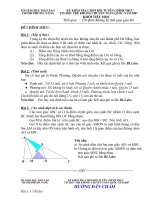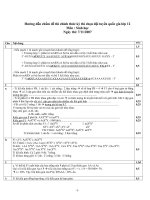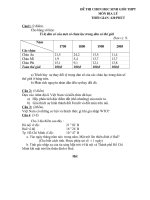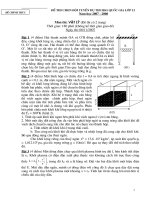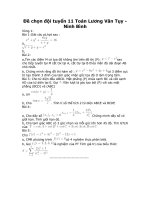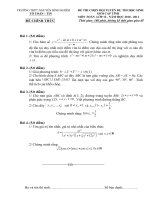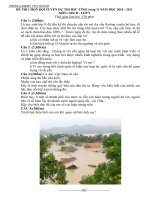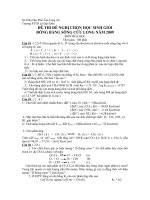ĐỀ CHỌN đội TUYỂN Anh 2016 2017, round 1
Bạn đang xem bản rút gọn của tài liệu. Xem và tải ngay bản đầy đủ của tài liệu tại đây (206.2 KB, 15 trang )
SỞ GD&ĐT NGHỆ AN
KỲ THI CHỌN ĐỘI TUYỂN DỰ THI HSG QUỐC GIA
BẬC THPT NĂM HỌC 2016 – 2017
ĐỀ CHÍNH THỨC
Môn thi: TIẾNG ANH
Thời gian làm bài thi: 180 phút (không kể thời gian giao đề)
Ngày thi:
Đề thi có
trang
•
•
Thí sinh không được sử dụng tài liệu, kể cả từ điển
Giám thị không giải thích gì thêm
Số phách
Điểm bằng số:.............................
Họ tên, chữ ký GK 1:.................................................
Điểm bằng chữ:..........................
Họ tên, chữ ký GK 1:................................................
SECTION A: LEXICO-GRAMMAR
Part 1: For questions 1 –15, choose the correct answer (A, B, C or D) to each of the following
questions and write your answers in the corresponding numbered boxes.
1. The Roundhouse hotel is________named for its shape.
A. despicably
B. eerily
C. aptly
D. wantonly
2. Her name keeps ________in conversation.
A. pumping up
B. speaking up
C. filling up
D. cropping up
3. We sent him to the best school in England and hired the best teachers, but it was all ___as he has no
will to learn at all.
A. vain
B. inaccurate
C. invalid
D. futile
4. The missing hitchhiker had been ___dead until the sensational message came from the small town
in Oregon where he was found alive.
A. estimated
B. presumed
C. assessed
D. speculated
5. The comforting news from my sister was a real ___off my mind.
A. stone
B. deal
C. load
D. mass
6. I’d opt for a glass of mineral water just to ____my thirst.
A. quit
B. quench
C. quiver
D. quieten
7. You needn’t treat to us anything as we won’t stay long for it’s only a ____visit.
A. minute
B. flying
C. small
D. speedy
8. I didn’t really feel like memorizing all these definitions. It was only the risk of getting another bad
mark that made me ___myself.
A. exert
B. absorb
C. endeavour
D. deploy
9. Don’t forget to leave your ___address in case we have to send your mail to the new place.
A. pursuing
B. forwarding
C. advancing
D. following
10. Numerous ____have prevented us from going to the lakeside again this year.
A. inhibitions
B. deterrents
C. impairments
D. adversities
Page 1 of 15 pages
11. Don’t be angry with Sue. All that she did was in good___
A. hope
B. belief
C. idea
D. faith
12. To the best of my ____that dentist’s name was Thomas.
A. thinking
B. recollection
C. mind
D. remembrance
13. Richard has forgotten to buy tickets for the performance and ___we’ll have to spend this evening
in front of the TV set.
A. whereas
B. thereafter
C. whereupon
D. therefore
14. Julia finally __and admitted that she had stolen the money.
A. made a clean breast of it
B. made herself on the level
C. took her down a peg or two
D. buried the hatchet
15. She marched into the shop, as bold as___, and demanded for her money back.
A. bass
B. grass
C. brass
D. glass
Your answers
1.
6.
11.
2.
7.
12.
3.
8.
13.
Page 2 of 15 pages
4.
9.
14.
5.
10.
15.
Part 2: For questions 16-20, write the correct FORM of each bracketed word in the numbered
space provided in the column on the right.
Your answers
Few British politicians have aroused more passion than Margaret
Thatcher, who was Prime Minister from 1979 until 1990. It is not
(16) INCIDENT_____that, during her premiership, Britain went through
a period of (17) MOMENT_________change. Those who support
Thatcher's policies say she was responsible for changing Britain's
(18) ANTIQUE____ union laws and smashing union power, paving the
way for the creation of a modern, competitive economy which required
much higher productivity , efficiency and wage-restraint on the part of the
workers than in the past. One of her core beliefs was that it was
management which was responsible for running companies, rather than
unions or the government.
(19) CRITIC_________of Margaret Thatcher point to the very high
unemployment figures of the 1980s-the official jobless total had risen
from just over one million people out of work in 1979 to over three
million by 1982.
When Margaret Thatcher realized that she had lost the support of many of
her MPs in November and stood down as Prime Minister, the nation was
split. Some saw her resignation as (20) TIME______, and wished she
would continue. Others felt it could have come too soon. Even today,
historians and economists are divided as to whether her legacy was
positive or negative overall.
16. ________________________
17. ________________________
18. _______________________
19. _______________________
20. ______________________
Part 3: The following passage contains 10 mistakes. Identify and correct it.
Stressful situations that emerge mostly every day in life seem to be unavoidable. However, we can do
little sometimes to avoid a misfortune or a pleasant occurrence which may befall us expectedly as only
it can. At such a moment, one may hit the roof, give in to the helplessness of the situation or, ideally,
put a brave face on it trying to bear the burden.
Can you envision in your mind an hour spending in a traffic jam, say, this morning? Do you light one
cigarette after the other? Do you sound the horn every few seconds like the other neurotics? Or do you
take a different stance and withstand the stressful moment you can also do a crossword puzzle, listen
to your favorite music and even compose a menu for your Sunday dinner.
In fact, whatever way you respond to the annoying situation, you can exert no impact on it as the
traffic jam will only reduce on due course .Nevertheless, your reaction might considerably influence
your mood for the rest of the day. The inability to confront a stressful occurrence like that with a deal
of composure and sensibility adds much more strain on your life and in this way puts your well-being
in jeopardy. Surprisingly, it’s the seeming negligible hardships we stumble on daily that run double the
Page 3 of 15 pages
risk of developing serious health disorders other than our isolated tragedies however painful they may
be.
Given that so many of those wretched stress inducing troubles affect us in a day, we should, at best,
try to avoid them or possibly do radical alterations in the way we lead our daily lifestyles.
Your answers:
Mistake
21.
22.
23.
24.
25.
Correction
Mistake
26.
27.
28.
29.
30.
Correction
Part 4: Read the following passage and fill in each gap with a suitable preposition or a particle
Arranged marriage
The usual western idea of marriage is that you meet someone, fall in love, and then decide to marry
each other. For those born (31)______some cultures, however, marriage may have quite a different
meaning. (32)___an arranged marriage, it is the parents who choose the partner and it’s possible for
the young person getting married not to meet their future bride or groom (33)___ person until the day
of the wedding. Indeed, a young person might be promised to another (34)____a child, many years
before the wedding day.
(35)____communities that practise arranged marriage, it's not unusual for a generation gap to open
(36)___between parents and children, (37)___many young people refusing to accept an arranged
marriage. However, if the partners treat each other (38)___respect and recognise that they are both
(39)__equal value, there doesn't seem to be any real barrier (40)___having a happy married life.
Your answers
31.
36.
32.
37.
33.
38.
34.
39.
35.
40.
SECTION B: READING
Part 1: For questions 41 – 50, fill each of the following numbered blanks with ONE suitable word and
write your answers in the corresponding boxes provided below the passage.
It is the human factor that (41)______ to the absolute majority of road accidents which involve the
tremendous toll of fatalities each year. (42_)____, less decisive, causes are vehicle malfunctions or road
shortcomings.
Speeding motorists are (43)____for failing to give way at junctions, misjudging the situation on the road or
being unable to accurately estimate the distance while overtaking the ‘snail-pacers’ ahead.
Drinkers who settle (44)____the wheel after one glass or two may running the risk of causing a tragedy
through their impaired perception, which is not so rare a (45)_____, again.
Unfortunately, it is much simpler to introduce the necessary alterations in the traffic system than change
the behavioral patterns of drivers. There are voices that more severe disciplinary resolutions ought to be put
Page 4 of 15 pages
into (46)______if the vehicle users are to benefit from greater security on the road. The idea of producing
safe road users through pre-school parental instruction or through incorporating the safety regulations into
the school curriculum has been (47)____acclaimed in many communities and is expected to (48)____the
required results as the first step in bettering the qualifications of the future drivers and acquainting
(49)____with the potential hazards that may (50)________en route.
41.
46.
Your answers
42.
47.
43.
48.
44.
49
45.
50.
Part 2: For questions 51-62, read the text below and decide which answer (A,B, C or D) best fits
each gap.
Sleeping disorders like insomnia can prove to be a worrying question for many of us. Almost anyone
can easily conjure (51)___at least one sleepless night of (52)___ and turning in bed awaiting the bliss
of a deep dream. Most probably, a third of us undergo the distressing experience at least once a week.
Even though it is possible for people to (53)___without any sleep at all for a period of time, such
occurrences are rather few and far between and there is no evidence to (54)___ this assumption. What
is sure, however, is the fact that we do need some steep to regenerate our strength and to (55)___the
brain to its proper activity. No wonder, then, that the tiredness and fatigue that appear after a sleepless
night (56)__ many of us to go for chemical support in the form of sleep (57)___ tablets or powders.
However long the problem of sleeplessness has afflicted many individuals, very little has been
(58)___in the question of its original causes. We are conscious that it usually (59)___ those who are
exposed to a great deal of stress, anxiety or depression. It may also be (60)___ by overworking or
unfavorable surroundings with scarcity or fresh air.
Sleeping pills may provide some relief as an alternative in this desperate situation. Yet, they do little to
combat the ailment in full. Consequently, our hopes should be (61)__on the medical authorities to
(62)___ the root cause insomnia before we take to being nocturnals leading our noisy lives in the dead
of night.
51. A. up
52. A. rolling
53. A. operate
54. A. proclaim
55. A. recuperate
56. A. exert
57. A. inducing
58. A. disparaged
59. A. betrays
60. A. engendered
61. A. placed
62. A. emerge
B. about
B. wriggling
B. process
B. endure
B. restore
B. affect
B. attaining
B. retrieved
B. besets
B. applied
B. ascribed
B. release
C. off
C. tossing
C. function
C. invalidate
C. revive
C. enforce
C. exacting
C. detected
C. bemoans
C. instigated
C. focused
C. determine
Page 5 of 15 pages
D. out
D. spinning
D. perform
D. substantiate
D. resume
D. compel
D. contributing
D. originated
D. bestows
D. evolved
D. attached
D. confess
51.
57.
Your answers
52.
58.
53.
59.
54.
60.
55.
61.
56.
62.
Part 3: Read the following passage and answer the questions 63-75
Is it time to halt the rising tide of plastic packaging?
A. Close up, plastic packaging can be a marvelous thing. Those who make a living from it call it a
forgotten infrastructure that allows modern urban life to exist. Plastics have helped society defy
natural limits such as the seasons, the rotting of food and the distance most of us live from where our
food is produced. And yet we do not like it. Partly we do not like waste, but plastic waste, with its
hydrocarbon roots and industrial manufacture is especially galling. In 2008, the UK, for example,
produced around two million tonnes of plastic waste, twice as much as in the early 1990s. The very
qualities of plastic - its cheapness, its indestructible aura - make it a reproachful symbol of an
unsustainable way of life. The facts, however, do not justify our unease. All plastics are, at least
theoretically, recyclable. Plastic packaging makes up just 6 to 7 per cent of the contents of British
dustbins by weight and less than 3 per cent of landfill. Supermarkets and brands, which are under
pressure to reduce the quantity of packaging of all types that they use, are finding good
environmental reasons to turn to plastic: it is lighter, so requires less energy for transportation than
glass, for example; it requires relatively little energy to produce; and it is often re-usable. An
Austrian study found that if plastic packaging were removed from the supply chain, other packaging
would have to increase fourfold to make up for it.
B. So are we just wrong about plastic packaging? Is it time to stop worrying and learn to love the
disposable plastic wrapping around sandwiches? Certainly there are bigger targets for environmental
savings such as improving household insulation and energy emissions. Naturally, the plastics industry
is keen to point them out. What s more, concern over plastic packaging has produced a squall of
conflicting initiatives from retailers, manufacturers and local authorities. It’s a squall that dies down
and then blows harder from one month to the next. ‘It is being left to the individual conscience and
supermarkets playing the market,’ says Tim Lang, a professor specializing in food policy. ‘It’s a mess’
C. Dick Searle of the Packaging Federation points out that societies without sophisticated packaging
lose half their food before it reaches consumers and that in the UK, waste in supply chains is about 3
per cent. In India, it is more than 50 per cent. The difference comes later: the British throw out 30 per
cent of the food they buy - an environmental cost in terms of emissions equivalent to a fifth of the
cars on their roads. Packagers agree that cardboard, metals and glass all have their good points, but
there’s nothing quite like plastic. With more than 20 families of polymers to choose from and then
sometimes blend, packaging designers and manufacturers have a limitless variety of qualities to play
with.
D. But if there is one law of plastic that, in environmental terms at least, prevails over all others, it is
this: a little goes a long way. This means, first, that plastic is relatively cheap to use - it represents just
over one-third of the UK packaging market by value but it wraps more than half the total number of
items bought. Second, it means that even though plastic encases about 53 per cent of products bought,
it only makes up 20 per cent by weight of the packaging consumed. And in the packaging equation,
Page 6 of 15 pages
weight is the main issue because the heavier something is, the more energy you expend moving it
around. In view of this, righteous indignation against plastic can look foolish.
E. One store commissioned a study to find precise data on which had less environmental impact:
selling apples loose or ready-wrapped. Helene Roberts, head of packaging, explains that in fact they
found apples in fours on a tray covered by plastic film needed 27 per cent less packaging in
transportation than those sold loose. Steve Kelsey, a packaging designer, finds the debate frustrating.
He argues that the hunger to do something quickly is diverting effort away from more complicated
questions about how you truly alter supply chains. Rather than further reducing the weight of a plastic
bottle, more thought should be given to how packaging can be recycled. Helene Roberts explains that
their greatest packaging reduction came when the company switched to re-usable plastic crates and
stopped consuming 62,000 tonnes of cardboard boxes every year. Plastic packaging is important, and
it might provide a way of thinking about broader questions of sustainability. To target plastic on its
own is to evade the complexity of the issues. There seems to be a universal eagerness to condemn
plastic. Is this due to an inability to make the general changes in society that are really required?
‘Plastic as a lightweight food wrapper is now built in as the logical thing,’ Lang says. ‘Does that make
it an environmentally sound system of packaging? It only makes sense if you have a structure such as
exists now. An environmentally driven packaging system would look completely different.’ Dick
Searle put the challenge another way. ‘The amount of packaging used today is a reflection of modern
life.”
Questions 63-67:
Choose the correct heading for each paragraph, A-E, from the list of headings below.
Write the correct number, i-viii, in the numbered spaces below
List of headings
i. A lack of consistence policy
ii. Learning from experience
iii. The greatest advantage
iv. The role of research
v. A unique material
vi. An irrational anxiety
vii. Avoiding the real challenges
viii. A sign of things to come
Your answers
63. Paragraph A. 64.Paragraph B
_____________
__________
65. Paragraph C
___________
Page 7 of 15 pages
66. Paragraph D
___________
67. Paragraph E
____________
Question 68-72: Look at the following statement and the list of people below. Match each statement
to the correct person (A_D).Write the correct letter A-D in the numbered spaces provided. You may
use any letter more than once
68. Comparison of two approaches to packaging revealed an interesting result
69. People are expected to do the right thing.
70. Most food reaches UK shops in good condition.
71. Complex issues are ignored in the search for speedy solutions.
72. It is merely because of the way societies operate that using plastic seems valid.
People
A. Tim Lang
68.
B. Dick Searle
Your answers
69.
C. Helene Roberts
70.
71.
D.Steve Kelsey
72.
Questions 73-75 Complete the summary below.
Write NO MORE THAN ONE WORD from the text for each answer. Write your answers in
the numbered spaces provided
A revolutionary material
Plastic packaging has changed the way we consume food. However, we instinctively dislike it, partly
because it is the product of (73)___processes, but also because it seems to be (74)__so we feel it is
wasteful. Nevertheless, it is thanks to plastic that for many people their choice of food is no longer
restricted by the (75)__in which it is available or the location of its source.
Your answers
73.
74.
75.
Part 4: You are going to read a newspaper article about exam technology. For questions 76-81,
choose the answer (A, B, C or D) which you think fits best according to the text.
The future of exams
Like it or not, technology is already an established part of the exam process and the only argument
still to be fought at this year's e-assessment conference and exhibition, taking place in London this
week, is just how much further in that direction we should go.
At one end, little has changed. Students still, by and large, take exams in much the same way as they
always have. They walk into a room full of desks with an invigilator on hand to tell them when to
start and stop and to make sure no one is texting anyone else, and everyone is ticking the right boxes,
or writing out the answer in longhand if required. It's once the ink has dried that the real change in the
Page 8 of 15 pages
system kicks in. Instead of divvying up the scripts between the thousands of markers, they are now
scanned into a central computer and the markers then access them online.
The benefits are obvious. It's quicker, cheaper and more efficient. The really dull components, such as
multiple choice or simple questions such as "name four things that contribute to global warming", can
be marked automatically or by less experienced markers, whereas questions requiring a more
nuanced, longer answer can be left to the old hands. Your best markers don't have to be wasted on
the straightforward stuff.
Students can also benefit. "Markers can now give much more precise feedback", says Kathleen
Tattersall, who chairs the Institute of Educational Assessors. "We can tell someone almost exactly
what he or she needs to do to improve a grade because we can show them what they got right and
wrong. This is particularly useful for anyone looking to resit a January exam in the summer, because
teachers can tailor individual revision plans for all their students."
For all its advantages, no one reckons that this assessment model is the finished article. "There are
difficulties that need to be ironed out", says Martin Walker, a former English teacher and a principal
examiner for one of the main boards. "Because markers are now often only given a few questions
from each paper, it's hard to get an accurate feel of exactly what a student does and doesn't know.
When you had an entire exam script in front of you, you could build up a picture of the candidate's
range of knowledge, so when there was room for doubt in an answer you could make a judgement
call based on previous responses. It's much harder to do that now.
"There are also limits to what you can easily read on screen", he adds. "In my experience, most
examiners end up printing out the long essays and working from a hard copy, which is both timeconsuming and slightly self-defeating." The danger, as Tattersall concedes, is that schools end up
teaching only what technology is capable of assessing. "Rather, we have to look at how IT is used in
the classroom to improve teaching and learning and base our exams on that model", she says.
It is certain that we are only halfway through the electronic revolution. In the coming years, more
and more exams will be completed - as well as marked - online, and the government and the
Qualifications and Curriculum Authority will have to think hard about ways of maintaining
standards.
By far the easiest form of online testing to implement is multiple choice. A student can take the test
online and it can be automatically marked instantaneously; this system is almost foolproof. The
downside is that most people associate multiple choice with dumbing down, on the grounds that
anything that can be reduced to a yes or no, right or wrong answer is bound to be over-simplified.
"Not true", says Stevie Pattison-Dick, head of communications for Edexcel. "Some multiple-choice
exams may be quite straightforward, but if they are, they only reflect the level of knowledge a
student is expected to attain. There's nothing inherently simple about multiple choice. We've
become very sophisticated in our question setting and are able to cross-reference the answers, so an
examiner can now tell whether someone just got lucky by ticking the right box or actually
understood the process on which he or she was being assessed." One of the final exams a medical
student has to pass before qualifying as a doctor is multiple choice, so this method of assessment has
to be extremely rigorous.
Page 9 of 15 pages
76. The writer believes that
A. nothing of significance has changed in the exam system.
B. a revolution in exam taking may soon be initiated.
C. many students cheat by using their mobile phones.
D. technology doesn’t greatly affect students when they sit exams.
77. What does the writer mean by ‘old hands’ in paragraph 3?
A. retired examiners
B. experienced examiners
C. examiners who have reached a certain age
D. mature students
78. Which of the following is not mentioned as a benefit of computer marking?
A. better utilisation of examiners
B. more interesting questions can be set
C. many set questions do not need human markers at all
D. financial advantages
79. What is stated to be a disadvantage of the current system?
A. Many examiners complain that the work is boring now.
B. Examiners no longer have enough work.
C. Examiners have a limited impression of the candidate.
D. Examiners aren’t as skillful as they used to be.
80. What is implied about the general perception of multiple-choice testing?
A. It is easy for a student to cheat.
B. It reduces the student’s writing skills.
C. It lowers the standard of the exam.
D. It’s impossible for a computer error to be made.
81. According to Stevie Pattison-Dick, multiple-choice exams
A. do have a large element of chance in them.
B. are not always the best way to test medical students.
C. are by far the best way to test students on particular subjects.
D. can be composed in a way that makes students reaffirm their knowledge.
76.
Your answers
77.
78.
79.
80.
81.
Part 5: Read some extracts of people talking about their jobs. For questions 82-90, choose from
the extracts (A-F). The extracts may be chosen more than once.
In which extract is the following mentioned
82. A situation that makes you realise you are ageing
83. Initial hostile behaviour that can be changed .
84. Treating people as you wish to be treated yourself.
Page 10 of 15 pages
Your answers
___________________
___________________
___________________
85. People anxious for news
86. A family member taking credit for someone’s success
87. Longing for a more conventional life.
88. The risk of being physically attacked
89. Needing a certain amount of courage.
90. Not intending to follow the career they have ended up doing.
___________________
___________________
___________________
___________________
___________________
___________________
SECTION C: WRITING
Part 1: Read the following extract and use your own words to summarize it. Your summary should
between 140 and 160 words long. You MUST NOT copy the original.
A boyfriend and girlfriend we love us dumps us. How do we react? Most of us go through a period of
crying our eyes out. But have you ever wondered why humans cry? Most mammals produce tears to
clean and lubricate the eyes but humans are unique-perhaps with the exception of gorillas and
elephants-in producing tears in response to emotional stimuli. We might feel like crying when we hear
sad news, or even cry with happiness. Scientists are unsure what, if any, benefits there are from crying
as it has little or no immediate effect on the situation that has produced the tears. However, many
people do say that they feel the benefits of a good cry in that after it they are emotionally stronger, so it
is possible that crying does in some ways help us to get over difficult emotional situations.
Some societies look down on adults crying. This attitude is sometimes seen in the society’s language.
Expressions such as “there’s no point crying over split milk” and “grin and bear it” in English reflect
a culture that-at least historically-does not value adult crying.
Crying can also be used as a means of deception. If you cry “crocodile tears”, you are putting on an
act-pretending to be upset when in fact you are not.
Part 2: The chart below gives information about science qualifications held by people in two countries.
Summarize the information by selecting and reporting the main features, and make comparisons where
relevant. Write at least 150 words.
Page 11 of 15 pages
……………………………………………………………………………………………………………
……………………………………………………………………………………………………………
……………………………………………………………………………………………………………
……………………………………………………………………………………………………………
……………………………………………………………………………………………………………
……………………………………………………………………………………………………………
……………………………………………………………………………………………………………
……………………………………………………………………………………………………………
……………………………………………………………………………………………………………
……………………………………………………………………………………………………………
……………………………………………………………………………………………………………
……………………………………………………………………………………………………………
……………………………………………………………………………………………………………
……………………………………………………………………………………………………………
……………………………………………………………………………………………………………
……………………………………………………………………………………………………………
……………………………………………………………………………………………………………
……………………………………………………………………………………………………………
Part 3: Some people think history has nothing or little to tell us, but others think that studying the past
history can help us better understand the present.
Page 12 of 15 pages
In about 400 words, write an essay to discuss the two views and express your opinion on the issue. Use
reasons and examples to support your position. You may continue your writing on the back page if you
need more space.
Page 13 of 15 pages
…………………………………………………………………………………………………………………
………………………………………………………………………………………………………
……………………………………………………………………………………………………………
……………………………………………………………………………………………………………
……………………………………………………………………………………………………………
……………………………………………………………………………………………………………
……………………………………………………………………………………………………………
…………………………………………………………………………………………………………………
………………………………………………………………………………………………………
………………………………………………………………………………………………………
……………………………………………………………………………………………………………
……………………………………………………………………………………………………………
……………………………………………………………………………………………………………
……………………………………………………………………………………………………………
……………………………………………………………………………………………………………
……………………………………………………………………………………………………………
……………………………………………………………………………………………………………
……………………………………………………………………………………………………………
……………………………………………………………………………………………………………
……………………………………………………………………………………………………………
……………………………………………………………………………………………………………
……………………………………………………………………………………………………………
……………………………………………………………………………………………………………
……………………………………………………………………………………………………………
……………………………………………………………………………………………………………
……………………………………………………………………………………………………………
……………………………………………………………………………………………………………
……………………………………………………………………………………………………………
……………………………………………………………………………………………………………
……………………………………………………………………………………………………………
……………………………………………………………………………………………………………
…………………………………………………………………………………………………………………
………………………………………………………………………………………………………
……………………………………………………………………………………………………………
……………………………………………………………………………………………………………
……………………………………………………………………………………………………………
Page 14 of 15 pages
……………………………………………………………………………………………………………
……………………………………………………………………………………………………………
……………………………………………………………………………………………………………
……………………………………………………………………………………………………………
……………………………………………………………………………………………………………
……………………………………………………………………………………………………………
- THE END -
Page 15 of 15 pages
